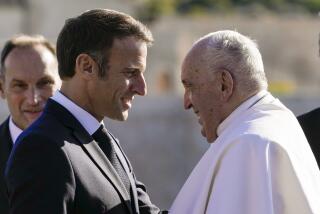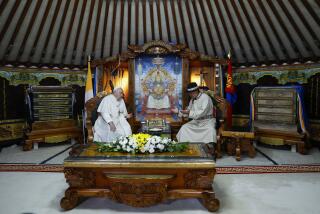Pope Visits Lepers on an Emotional, Exhausting Day in Africa
- Share via
BAMAKO, Mali — For some it may have been Super Bowl Sunday, but for others in African squalor, World Leprosy Day counted more. For Pope John Paul II, Sunday proved a day as physically and emotionally challenging as any 69-year-old man-with-a-mission could pray for.
The indefatigable Pope labored for 15 hours in 10 events Sunday on the fourth day of his journey through some of the world’s poorest countries on the southern fringes of the Sahara Desert.
John Paul began his day early in Portuguese on the green and swampy African coast and ended it near midnight in French here in land-locked Mali.
On a day that was an exhilarating and an exhausting microcosm of more than 300 days of foreign travel on 45 trips in his 11-year reign, John Paul delivered six speeches.
In a message marking World Leprosy Day, John Paul railed at “the scourge of leprosy” and the failure of a modern society to counter a disease that afflicts about 15 million people worldwide, most of them poor.
In a grove of cashew trees along a dusty road--not far from the capital of Guinea-Bissau where John Paul slept Saturday--the Pope visited a leprosarium run for 35 years by Italian Franciscan priests.
Hand outstretched, the Pope moved among the lepers. He kissed the baby of a woman leper and made an unscheduled stop in the mud-and-thatch hut of a prematurely old man with a handful of young children and a ravaged arm. The only furnishing was a cooking pot resting on a floor stove.
As John Paul left the hut, his Polish secretary, rummaging through his pocket for a token of the papal visit, pulled out the first thing that came to hand and gave it to a leper: a $100 bill.
Still in Portuguese, John Paul made a farewell address to President Joao Bernardo Vieira’s government, calling the leprosarium “emblematic of the drama in which many Guinea-Bissauans still live, grappling with illness and unfilled needs that are depressing and paralyzing.”
From coastal Guinea-Bissau, John Paul flew northeast to Mali, a former French colony of 9 million where Roman Catholics are a 1% minority in a population that is 80% Muslim but where religious frictions are minimal.
The Pope switched to French for his arrival statement: “I wish to meet the faithful of different religions in a spirit of dialogue.”
In hazy, dusty and poor Bamako, a city of 650,000 where a huge mosque is a prominent landmark, the Pope followed a by-now familiar routine. He prayed with priests and nuns at the Bamako Cathedral, telling them to be steadfast in their mission, particularly in adversity.
Later, John Paul dined with the local archbishop.
Still going strong at 9:50 p.m., he met with leaders of other religions in a country that, like so many of its neighbors, has grown weary of unfulfilled Marxist expectations and is turning increasingly to the West.
After the ecumenical meeting, a fixture of his foreign trips, John Paul remained in the North Korean-built Palace of Culture for an encounter with Malian young people and his final address of the long day.
He will be up again early this morning, off to Burkina Faso, the fourth stop of his five-country pilgrimage that will continue in Chad before the Pope returns to the Vatican on Thursday.
More to Read
Sign up for Essential California
The most important California stories and recommendations in your inbox every morning.
You may occasionally receive promotional content from the Los Angeles Times.










